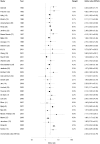Risk for asthma in offspring of asthmatic mothers versus fathers: a meta-analysis
- PMID: 20405032
- PMCID: PMC2853568
- DOI: 10.1371/journal.pone.0010134
Risk for asthma in offspring of asthmatic mothers versus fathers: a meta-analysis
Abstract
Background: Many human epidemiologic studies demonstrate that maternal asthma confers greater risk of asthma to offspring than does paternal disease. However, a handful have shown the opposite. Given this disparity, a meta-analysis is necessary to determine the veracity and magnitude of the "maternal effect."
Methodology/principal findings: We screened the medical literature from 1966 to 2009 and performed a meta-analysis to compare the effect of maternal asthma vs. paternal asthma on offspring asthma susceptibility. Aggregating data from 33 studies, the odds ratio for asthma in children of asthmatic mothers compared with non-asthmatic mothers was significantly increased at 3.04 (95% confidence interval: 2.59-3.56). The corresponding odds ratio for asthma in children of asthmatic fathers was increased at 2.44 (2.14-2.79). When comparing the odds ratios, maternal asthma conferred greater risk of disease than did paternal asthma (3.04 vs. 2.44, p = 0.037). When analyzing the studies in which asthma was diagnosed by a physician the odds ratios were attenuated and no significant differences were observed (2.85 vs. 2.48, N = 18, p = 0.37). Similarly, no significant differences were observed between maternal and paternal odds ratios when analyzing the studies in which the patient population was 5 years or older (3.15 vs. 2.60, p = 0.14). However, in all cases the trend remained the same, that maternal asthma was a greater risk factor for asthma than paternal.
Conclusions/significance: The results show that maternal asthma increases offspring disease risk to a greater extent than paternal disease.
Conflict of interest statement
Figures



References
-
- Moorman JE, Rudd RA, Johnson CA, King M, Minor P, et al. National surveillance for asthma–United States, 1980–2004. MMWR Surveill Summ. 2007;56:1–54. - PubMed
-
- Masoli M, Fabian D, Holt S, Beasley R. The global burden of asthma: executive summary of the GINA Dissemination Committee report. Allergy. 2004;59:469–478. - PubMed
-
- Cohn L, Elias JA, Chupp GL. Asthma: mechanisms of disease persistence and progression. Annu Rev Immunol. 2004;22:789–815. - PubMed
-
- Anandan C, Nurmatov U, van Schayck OC, Sheikh A. Is the prevalence of asthma declining? Systematic review of epidemiological studies. Allergy 2009 - PubMed

